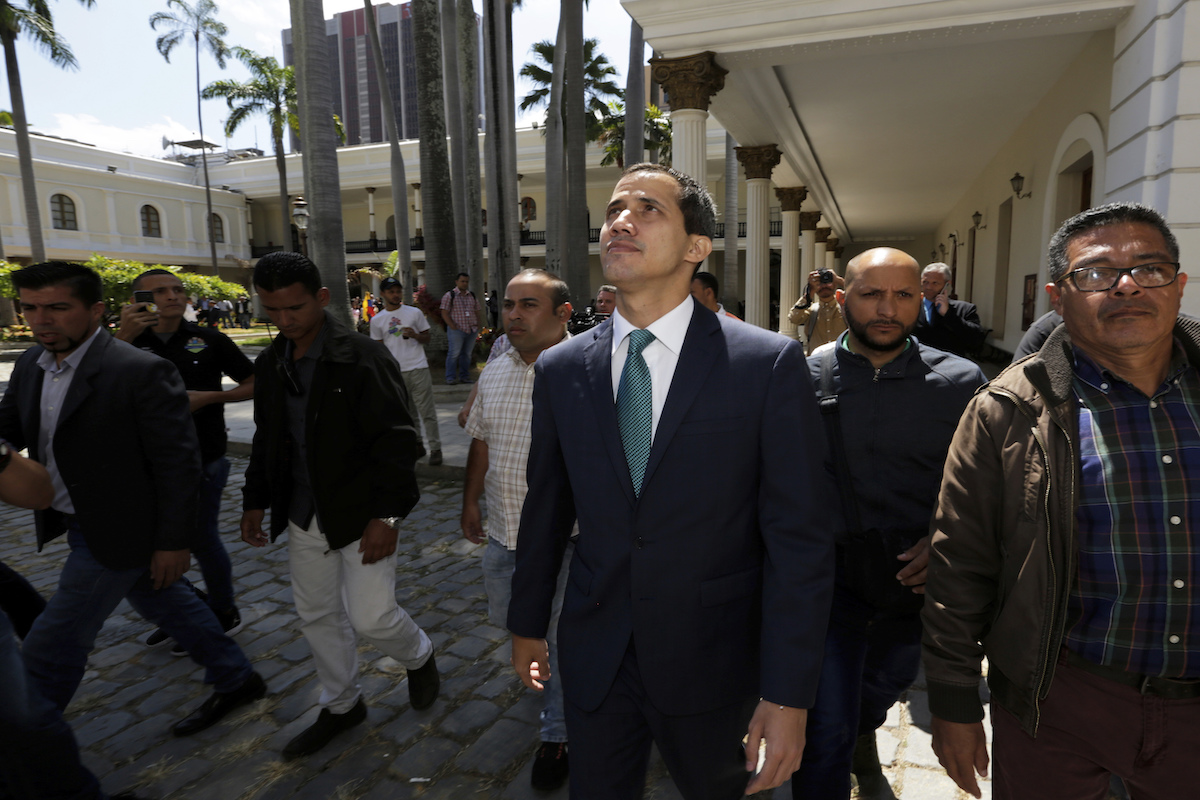

Opposition leader Juan Guaidó, surrounded by bodyguards upon his arrival at the National Assembly in Caracas, Venezuela, Monday, Feb. 4, 2019. (AP Photo/Fernando Llano)
The next act in the great drama unfolding in Venezuela will be determined by one central question: Will the unity forged in the opposition hold up?
Nicolás Maduro, although shaken by an economy in ruins and escalating humanitarian plight, continues to enjoy the broad support of the military. Individual defections at the border, much celebrated in the media, remain insignificant in view of the more than 300,000 military members that still toe the party line.
So far, the U.S.-backed opposition party has kept a lid on its heterogeneous coalition. Voluntad Popular (VP), the party of Juan Guaidó and Leopoldo López, remains united and focused.
However, recent days have put this unity to a test.
According to Alejandro Velasco, history professor of modern Latin America at New York University, the opposition in Venezuela only ever agreed on one thing, namely to get Hugo Chávez or Maduro out of power.
But what happens the day after has yet to be defined. We do not know what society the VP party envisions, and what concrete steps would be taken to realize that vision.
Today, the opposition is an even more diverse set of characters than in the past. Maduro is so unpopular that former comrades have filed into the opposition’s ranks. As a result, Voluntad Popular now includes both self-proclaimed Chavistas on one end of the spectrum, and groups that call for military intervention to get rid of Maduro on the other end. So far, VP has been able to make it all stick. However, what may still come to haunt the party is its unsavory marriage to President Trump. VP has not been shy about its closeness to the Trump administration. It is easy to see why. Many opposition supporters consider U.S. military muscle as an indispensable element to tipping the scales in the country. After so many years of political repression, the idea of self-determination has become a utopia to many.
Others likely feel uncomfortable with the close association with the current U.S. administration. Suspicions about U.S. intentions in the region go deep, and may well cross party lines.
It doesn’t help that the U.S. cast is made up of a group of neo-hawks whose imperialist overtures are not difficult to make out: Elliot Abrams, no stranger to intervention in Latin America, was recently named U.S. envoy to Venezuela. National Security Advisor John Bolton, always making an example of high diplomacy, already declared himself at the mere outset of the crisis by scribbling “5,000 troops to Colombia” in his notebook for the whole world to see. And in his latest claim to infamy, Senator Marco Rubio circulated pictures on Twitter from the brutal killing of late Libyan leader Gaddafi. Probably meant to inspire his social media followers, he linked his posts to a call for “prayers” for Venezuela.
— Marco Rubio (@marcorubio) February 24, 2019
Add to this the hypocrisy and anti-Latino bigotry that characterizes the current administration. This is a government that praises the North Korean leader, at the same time that it calls for the restoration of democracy in Venezuela. An administration that would have opted to cover up the murder by Saudi state officials of Jamal Khashoggi, at the same time that it denounces human rights violations in Venezuela. Not to mention the thousands of children and families separated at the Mexico-U.S. border and the anti-Latino agitation that now culminated in an invented national emergency.
It may well be that much of Trump’s rhetoric is intended for a U.S. audience, but the rest of the world certainly eavesdrops. And this includes those members of the Venezuelan opposition that may consider a U.S. invasion too high a price to pay to get rid of Maduro.
With its blunt rhetoric, the U.S. does a major disservice to Guaidó and his attempts to hold a heterogeneous coalition together. Some of his supporters will naturally feel alienated by the close collaboration with the Trump administration. It will be hard to convince them that what looks like an attempted U.S. invasion will bring the democratic freedom they so aspire to.
We already see some cracks. After Maduro denied the entrance of humanitarian aid into Venezuela, Guaidó called on the international community to consider all options to pressure Maduro. We know that some people close to him called specifically for the use of force, triggering internal debate and contention about the way forward. Guaidó quickly backtracked and clarified that he had meant to refer only to “diplomatic” options.
When Vice President Pence flew to Colombia to deliver another bellicose speech on Monday in front of his Latin American counterparts, he was met with a clear rejection of military intervention as an option to solve the crisis.
This may have given Maduro room to breathe.
In the meantime, Guiadó has to define a road ahead that unites his cast for the second act.
***
Luis Ortiz is the co-founder of Voces Latinoamericanas, a platform for political dialogue and commentary on Latin American affairs launched with the support of the McCourt School of Public Policy, Georgetown University. Follow @voceslatamerica.


